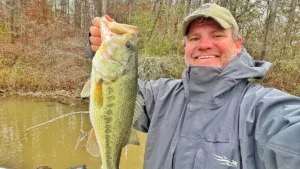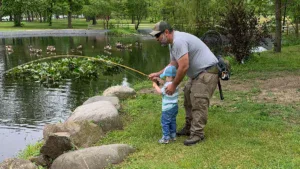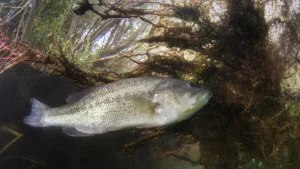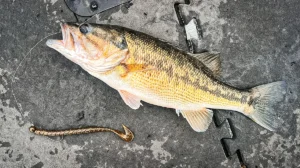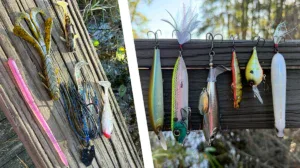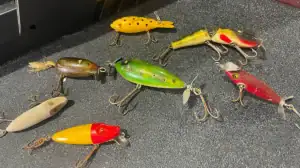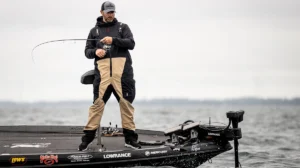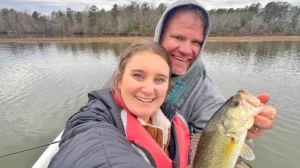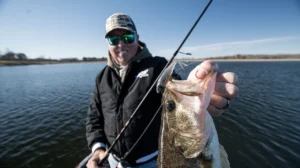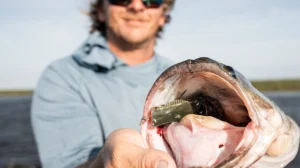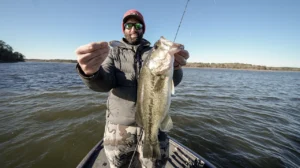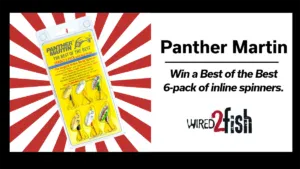For professional angler Bill Lowen, a swim jig is an essential shallow lure that excels at fishing clean, fast, and triggering bites. Known for his proficiency in this technique, Lowen dives deep and covers everything you need to know about swim jig fishing, such as where they excel, how to choose the best jig and trailer based on the situation, retrieve techniques, and his preferred rod setup.
THE VERSATILITY OF SWIM JIGS
Swim jigs are versatile lures that excel anytime you’re fishing shallow water with a little to a lot of cover; they easily come through bushes, grass, rocks, and docks. Lowen emphasizes the importance of having a swim jig tied on year-round due to its “everywhere” appeal and adaptability across habitats and seasons.
FEATURED TACKLE (retail links)
- JIG – Lure Parts Online Bill Lowen Swim Jig: Buy at Tackle Warehouse
- Lowen Series Jigs & Skirts At LurePartsOnline.Com
- TRAILER – Rapala CrushCity Cleanup Craw: Buy at Bass Pro Shops, Buy at Tackle Warehouse
- ROD – ARK Essence Series Casting Rod, 7’6” Medium Heavy – Fast: Buy at Tackle Warehouse
- REEL – ARK Fishing Gravity 7 Casting Reel (G7-107), 7.1:1: Buy at Tackle Warehouse
- LINE – Seaguar TactX Braid, 30- to 40-pound: Buy at Bass Pro Shops, Buy at Tackle Warehouse
- BOX – Flambeau WP5012 Double Deep Adjustable With Zerust: Buy at Tackle Warehouse
READING THE SWIM JIG BITE
Lowen’s approach starts with paying close attention to each bite, viewing them as puzzle pieces to the fish’s behavior. He stresses the significance of adjusting colors, trailer styles, and retrieval based on how the bass hit the bait. Short strikes? Swap up jig colors or trailer styles until they eat the bait deeper, or change to a lighter jig and slow down to keep the jig in their face longer.
JIG COLOR AND TRAILER SELECTION
The key to swim jig success is choosing the right color and trailer. Lowen recommends three primary colors: black and blue, green pumpkin, and white. These versatile colors work across the country, effectively imitating everything from bullhead to bluegills to shad. Trailers play a crucial role, too; Lowen alternates between trailers with varying actions, depending on the fish’s mood and the water clarity. On this day, he landed on a crawfish trailer with an abundant kick, and some added buoyancy to help skip the bait and float it through cover.
THE ROLE OF ELECTRONICS
Most don’t think of swim jig fishing as a time when electronics are particularly advantageous. Lowen disagrees, and usually keeps his forward-facing and 360 sonar on, especially when fishing adjacent to drop-offs. As he explains, it’s commonplace to see cover such as a laydown or boulder patch just out of view, or bass suspended just off the edge of the drop, targeting suspended forage. You could easily find yourself catching bass on jigs in open water!
TECHNIQUE AND GEAR PREFERENCE
Lowen shares his unique method of fishing swim jigs, focusing on keeping them in the strike zone for as long as possible. Unlike the typical fast-paced approach, he advocates for a slower, more deliberate retrieval to trigger tentative bass. He prefers a longer medium-heavy casting rod with a soft tip and stiff backbone for casting accuracy and hookset power, paired with a high-speed reel for quick line retrieval. He opts for a 30- to 40-braid, balancing line strength and action.
FISH FINDER & BOAT SETUP
- TROLLING MOTOR – Minn Kota Ultrex QUEST: Check out at Minn Kota
- FISH FINDERS (bow stack) – Humminbird APEX 13 MEGA SI+ Fishfinder/Chartplotter: Buy at Bass Pro Shops
- 360 SONAR – Humminbird MEGA 360 Imaging: Buy at Bass Pro Shops
- LIVE SONAR – Humminbird MEGA Live Imaging Transducer: Buy at Bass Pro Shops
- BASS BOAT – Xpress X21 Pro: Check out at Xpress Boats
- MOTOR – Yamaha V6 V MAX SHO 250 hp: Check out at Yamaha


